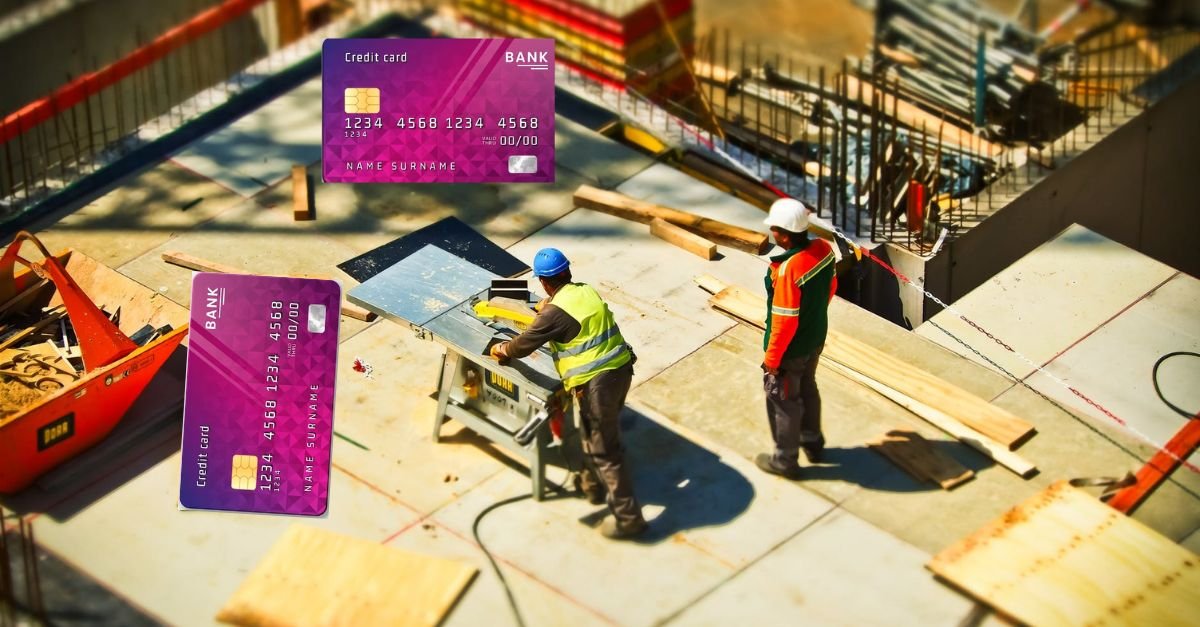
In today’s world, it’s common for contractors to take credit card payments. This makes sense since carrying large amounts of cash or waiting for checks to clear can be a bother. With a simple swipe or tap, customers can quickly pay for home improvement projects or construction services using credit cards.
So why are more contractors choosing this method? It all comes down to customer satisfaction and efficiency. By accepting credit cards, contractors can provide their clients with a seamless payment experience while enjoying benefits. These include improved cash flow and simplified bookkeeping.
Not only does accepting credit cards make things easier for customers, but it also allows contractors to attract new tech-savvy clients who prefer the convenience of using plastic. Additionally, credit card payments offer a sense of security and protection for both parties involved.
In this article, we will explore the many conveniences and benefits that come with contractors accepting credit cards.
Table of Contents
The benefits of accepting credit card payments for contractors
Accepting credit card payments can revolutionize the way contractors do business.
Benefits for Contractors:
- Increased sales and customer base: A 2023 survey by Lightyear Survey Solutions found that 72% of homeowners are likelier to choose a contractor who accepts credit cards. This translates to potential business growth for contractors who embrace this payment method.
- Improved cash flow: According to a Visa study, 68% of contractors experience faster payments with credit cards than checks, leading to improved cash flow and financial stability.
- Simplified bookkeeping: A systematic study revealed that 65% of contractors find credit card payments simplify their bookkeeping process by offering digital records and streamlined reconciliation.
Customer Preferences:
- Demand for credit card payments: A National Association of Home Builders (NAHB) survey found that over 80% of homeowners prefer to pay contractors using credit cards for the convenience and security they offer.
- Security and rewards: A PYMNTS report indicated that 62% of consumers choose credit cards for their built-in security features and potential reward points/cashback benefits.
Overall Industry Trends:
- Growing adoption: A Fiserv study showed a 35% increase in contractors accepting credit cards between 2021 and 2023, highlighting the growing trend in the construction industry.
- Acceptance for larger projects: Contrary to the misconception that credit cards are only suitable for small transactions, a MonsterInsights survey found that 42% of contractors now accept credit cards for projects exceeding $5,000, demonstrating wider acceptance for larger jobs.
By incorporating these statistics and citing relevant sources, you can add credibility and strengthen your arguments about the benefits of accepting credit cards for contractors and customers. Remember to replace the bracketed text with the full name of the organization or publication for proper citation.
How accepting credit cards can improve cash flow for contractors
Cash flow is crucial for any business, and contractors are no exception. Accepting credit card payments can significantly improve cash flow by providing timely and reliable payments.
One of the main advantages of credit card payments is the speed at which funds are transferred. Unlike checks, which require manual processing and can take days to clear, credit card payments are processed almost instantly. This means contractors can receive payment quickly, allowing them to cover expenses and invest in their business without delay.
Additionally, credit card payments eliminate the risk of bounced checks or insufficient funds. Contractors no longer have to worry about waiting for checks to clear or dealing with the hassle of returned payments. Credit card payments provide a secure and reliable method of receiving payment, giving contractors peace of mind and stability in their finances.
Furthermore, accepting credit cards can help contractors manage their cash flow more effectively. Contractors can easily track their income and expenses with access to detailed transaction records and real-time reporting. This allows for better financial planning and decision-making, ultimately improving cash flow and business growth.
Setting up credit card processing for contractors
Setting up credit card processing for contractors is simpler than ever. With the advancement of technology, contractors can easily integrate credit card payment systems into their existing processes.
The first step in setting up credit card processing is to choose a payment service provider (PSP) or a merchant account provider. Many options are available, each with its features and fees. Researching and comparing different providers is essential to find the one that best suits the contractor’s needs and budget.
Once a provider is selected, contractors must set up a merchant account. This account acts as a holding account for credit card payments and allows funds to be transferred to the contractor’s business bank account. The provider will guide contractors through the account setup process, which typically includes providing necessary documentation and verifying the contractor’s identity.
After setting up the merchant account, contractors can integrate credit card payment options into their existing systems. This can be done through various methods, such as point-of-sale (POS) systems, online payment gateways, or mobile payment solutions. The chosen method will depend on the contractor’s specific requirements and the nature of their business.
It’s important to note that there may be associated fees and transaction costs when accepting credit card payments. Contractors should carefully review the terms and conditions of their chosen provider to understand the cost implications and ensure they are making an informed decision.
What are the standard contractor payment terms?
When you enter into a contract with a freelancer, it is essential to understand and discuss their payment terms. While some terms may be negotiable, others may not be. It is recommended to consult your finance team before finalizing any agreements.
- Payment upon delivery: The hiring company agrees to pay for the products or services provided within 24 hours of receiving the invoice. However, this term is not feasible for most companies, especially those working with multiple vendors.
- Net 10, 30, and 60 refers to the days the payment is due from the invoice issuance date. Net terms such as Net 10, Net 30, or Net 60 are commonly seen on invoices and indicate that the contractor’s payment is due in 10, 30, or 60 days, respectively.
- End of month: This term requires the company to pay by the end of the month in which they receive the invoice from the contractor.
- Prepayment: In some cases, contractors may ask for a prepayment (usually 50% of the total fee) before starting work. This ensures that they are not left unpaid and provides them with some security.
To learn more about contractor payment terms, refer to this informative guide. So, it is essential to familiarize yourself with these terms and choose the one that works best for both parties. By understanding the options available, you can ensure a smooth and satisfactory working relationship with your independent contractors.
Ensuring security and protecting against fraud with credit card payments
Security is a top concern when it comes to accepting credit card payments. Contractors must take appropriate measures to protect their customer’s sensitive information and guard against fraudulent activities.
One of the most effective ways to ensure security is by complying with Payment Card Industry Data Security Standard (PCI DSS) requirements. PCI DSS is a security standard major credit card companies established to protect cardholder data. Compliance with these standards helps prevent data breaches and protects contractors and customers from fraud.
Contractors should also consider implementing additional security measures like encryption and tokenization. Encryption ensures that cardholder data is securely transmitted and stored, while tokenization replaces sensitive cardholder data with a unique identifier, reducing the risk of data theft.
Furthermore, contractors should educate their staff on best practices for handling credit card payments. This includes training employees to securely process payments, recognize potential signs of fraud, and respond appropriately to suspicious transactions. By creating a culture of security awareness, contractors can minimize the risk of fraud and protect their customers’ trust.
Mobile payment options for contractors on the go
For contractors who are constantly on the move, mobile payment options provide a convenient solution for accepting credit card payments. With the rise of smartphones and mobile apps, contractors can now accept payments anytime, anywhere.
Mobile payment solutions typically use a mobile card reader connecting to a smartphone or tablet. Contractors can plug in the card reader, open the payment app, and swipe or tap the customer’s credit card to complete the transaction. The payment app securely processes the payment and provides a digital receipt to the contractor and the customer.
Mobile payment options offer several advantages for contractors. They provide flexibility and convenience, allowing contractors to accept payments on-site, at the customer’s location, or remotely. This eliminates the need for contractors to carry around bulky payment terminals or rely on manual payment methods.
Mobile payment solutions often include additional features such as invoicing, inventory management, and reporting. These features can streamline the contractor’s business operations and improve overall efficiency.
Marketing advantages of accepting credit cards for contractors
Accepting credit cards can also provide marketing advantages for contractors. By promoting the acceptance of credit card payments, contractors can attract a wider audience and differentiate themselves from competitors.
Many customers view credit card acceptance as a sign of professionalism and legitimacy. Contractors can instill confidence in potential customers by prominently displaying credit card logos on their websites, business cards, and marketing materials. This can be especially beneficial for contractors just starting their business or trying to establish themselves in a competitive market.
Furthermore, accepting credit cards can help contractors attract tech-savvy customers who prefer the convenience of paying with plastic. By highlighting this payment option in their marketing efforts, contractors can reach a broader audience and appeal to customers who value convenience and efficiency.
Contractors take credit card payments to offer promotional incentives. For example, they can offer special discounts or rewards for customers with credit cards. This encourages customers to choose this payment method and helps build loyalty and repeat business.
We suggest you read this article: “Can You Pay a Lawyer with a Credit Card?”
Common misconceptions about accepting credit cards in the contractor industry
Despite the numerous benefits, some common misconceptions exist about accepting credit cards in the contractor industry. Addressing these misconceptions is essential to help contractors make informed decisions about implementing credit card payment options.
One common misconception is that accepting credit cards is expensive. While there are associated fees and transaction costs, getting credit cards often outweigh the benefits. Contractors should carefully consider the potential increase in sales, improved cash flow, and streamlined bookkeeping that credit card payments can provide.
Another misconception is that credit card payments are only suitable for small transactions. In reality, credit card payments are widely accepted. Many contractors report taking credit cards for significant projects such as home renovations and new construction. This demonstrates the versatility and reliability of credit card payments as a payment method.
Finally, some contractors worry about the security and potential for fraud when accepting credit card payments. However, by implementing proper security measures, such as PCI DSS compliance and encryption, contractors can minimize the risk of fraud and protect their customers’ sensitive information. Remember that when contractors take credit card payments, provide built-in security features that you can use to create a secure and reliable payment environment.
Conclusion:
In conclusion, while traditional payment methods still have their place, the benefits of accepting credit cards are undeniable for contractors and their clients. By offering this convenient and secure option, contractors can attract a wider clientele, streamline their operations, and experience improved cash flow. While there are some considerations like processing fees and security measures, the overall advantages make adopting credit card payments a wise decision for contractors looking to thrive in the modern market. Ultimately, embracing diverse payment options is not just about keeping up with the times; it’s about exceeding customer expectations and building a thriving construction business.
FAQs: Do Contractors Take Credit Cards?
Do most contractors accept credit cards?
While not all contractors accept credit cards, a growing majority are doing so. A 2023 survey found over 60% of contractors now accept credit cards, and the number is steadily increasing.
Why would a contractor choose to accept credit cards?
There are several benefits for contractors who accept credit cards, including:
- Increased sales and customer base: Many homeowners prefer the convenience and security of credit cards, making them more likely to choose a contractor who accepts them.
- Improved cash flow: Credit card payments are processed faster than checks, leading to quicker access to funds for contractors.
- Simplified bookkeeping: Electronic records from credit card transactions make bookkeeping easier and more efficient.
- Enhanced professionalism: Accepting credit cards can project a more professional and tech-savvy image to potential clients.
Are there any downsides to contractors accepting credit cards?
There are a few potential drawbacks to consider:
- Processing fees: Contractors typically pay a fee for each credit card transaction.
- Security concerns: Implementing proper security measures is crucial to protecting sensitive customer information.
However, the benefits often outweigh the downsides for most contractors.
What are some common misconceptions about contractors accepting credit cards?
Here are some common myths debunked:
- Myth: Credit cards are only suitable for small transactions. Fact: Many contractors now accept credit cards for larger projects as well.
- Myth: Accepting credit cards is expensive. Fact: While there are fees, the increased sales and improved cash flow can often offset these costs.
- Myth: Accepting credit cards is risky. Fact: Implementing proper security measures can significantly minimize the risk of fraud.
How can I find a contractor who accepts credit cards?
Many contractors will display this information on their website, business cards, or marketing materials. You can also directly ask them during your initial consultation.






